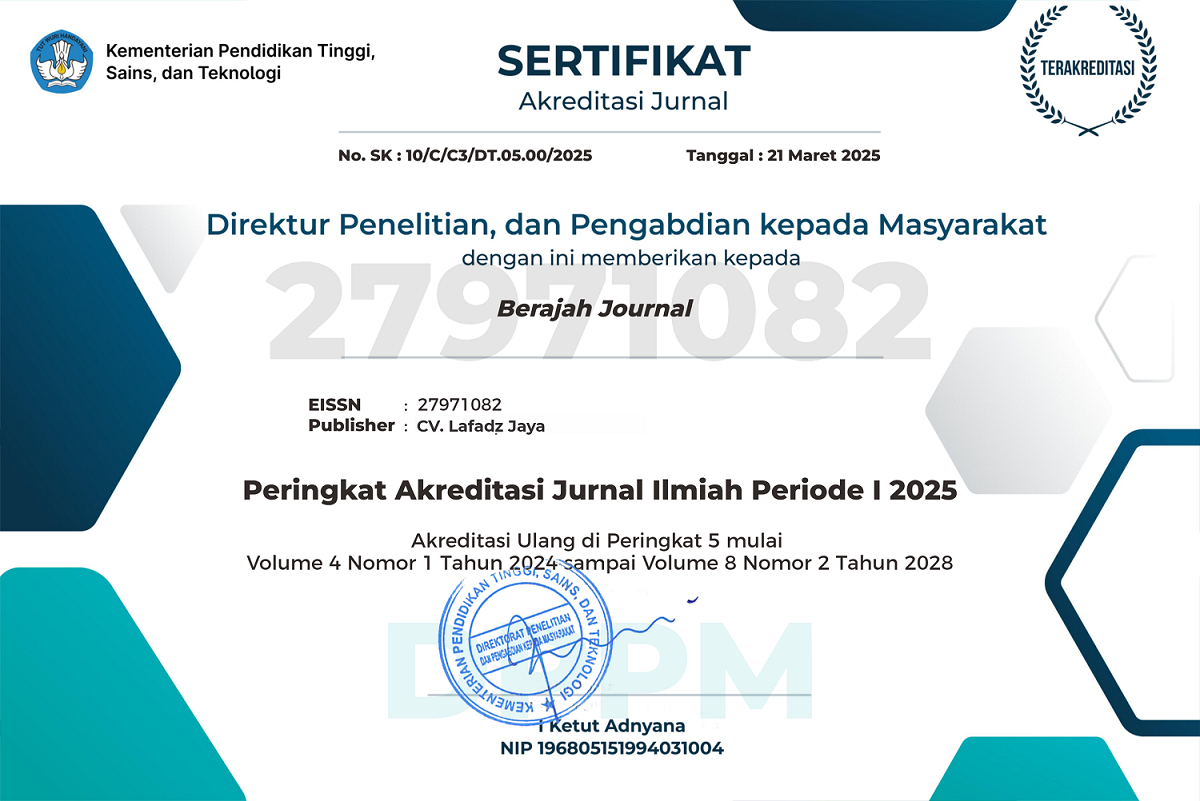PENGARUH WORKPLACE INCIVILITY TERHADAP WORK ENGAGEMENT DENGAN SUPERVISOR SUPPORT SEBAGAI VARIABEL MODERATOR PADA KARYAWAN MILENIAL
DOI:
https://doi.org/10.47353/bj.v2i3.138Keywords:
supervisor support, work engagement, workplace incivilityAbstract
Penelitian ini bertujuan untuk mengetahui pengaruh workplace incivility terhadap work engagement dengan supervisor support yang menjadi variabel moderator pada karyawan milenial. Metode penelitian yang digunakan adalah metode penelitian kuantitatif survei dengan pengambilan sampel pada karyawan milenial berusia 23-42 tahun berjenis kelamin laki-laki maupun perempuan. Terdapat sampel sejumlah 101 orang. Analisis data menggunakan metode moderated regression analysis (MRA) dengan bantuan aplikasi SPSS 25.0 for Windows. Hasil analisis data dari penelitian ini menunjukkan workplace incivility dengan work engagement sebesar 0,000 di bawah 0,05, yang berarti bahwa incivility memiliki pengaruh terhadap work engagement dan supervisor support sebagai variabel moderator 0,532 yang berarti tidak dapat memoderasi pengaruh workplace incivility terhadap work engagement.
Downloads
References
Al-Zyoud, M. F., & Mert, İ. S. (2019). Does employees’ psychological capital buffer the negative effects of incivility? EuroMed Journal of Business, 14(3), 239–250. https://doi.org/10.1108/EMJB-03-2018-0021
Bakker, A. B., & Demerouti, E. (2018). Multiple Levels in Job Demands-Resources Theory: Implications for Employee Well-being and Performance. Handbook of Well-Being , 2018, 1–13.
Bakker, Arnold B., Hakanen, J. J., Demerouti, E., & Xanthopoulou, D. (2007). Job resources boost work engagement, particularly when job demands are high. Journal of Educational Psychology, 99(2), 274–284. https://doi.org/10.1037/0022-0663.99.2.274
Cennamo, L., & Gardner, D. (2008). Generational differences in work values, outcomes and person-organisation values fit. Journal of Managerial Psychology, 23(8), 891–906. https://doi.org/10.1108/02683940810904385
Clark, C. M., & Davis Kenaley, B. L. (2011). Faculty empowerment of students to foster civility in nursing education: A merging of two conceptual models. Nursing Outlook, 59(3), 158–165. https://doi.org/10.1016/j.outlook.2010.12.005
Djamba, Y. K., & Neuman, W. L. (2002). Social Research Methods: Qualitative and Quantitative Approaches. In Teaching Sociology (Vol. 30, Issue 3). https://doi.org/10.2307/3211488
Eisenberger, R., Stinglhamber, F., Vandenberghe, C., Sucharski, I. L., & Rhoades, L. (2002). Perceived supervisor support: Contributions to perceived organizational support and employee retention. Journal of Applied Psychology, 87(3), 565–573. https://doi.org/10.1037/0021-9010.87.3.565
Han, S. J., Bonn, M. A., & Cho, M. (2016). The relationship between customer incivility, restaurant frontline service employee burnout and turnover intention. International Journal of Hospitality Management, 52, 97–106. https://doi.org/10.1016/j.ijhm.2015.10.002
Handoyo, S., Samian, Syarifah, D., & Suhariadi, F. (2018). The measurement of workplace incivility in indonesia: Evidence and construct validity. Psychology Research and Behavior Management, 11, 217–226. https://doi.org/10.2147/PRBM.S163509
Hisel, M. E. (2020). Measuring work engagement in a multigenerational nursing workforce. Journal of Nursing Management, 28(2), 294–305. https://doi.org/10.1111/jonm.12921
Kottke Janet, L., & Sharafinski, C. E. (1988). Kottke1988Pos and Pss.Pdf (pp. 1075–1079).
Mahmoud, A. B., Reisel, W. D., Grigoriou, N., Fuxman, L., & Mohr, I. (2020). The reincarnation of work motivation: Millennials vs older generations. International Sociology, 35(4), 393–414. https://doi.org/10.1177/0268580920912970
Pearson, C. M., Andersson, L. M., & Porath, C. L. (2000). Assessing and attacking workplace incivility. Organizational Dynamics, 29(2), 123–137. https://doi.org/10.1016/s0090-2616(00)00019-x
Pradipto, Y. D., & Nabila. (2021). The effect of work satisfaction on turnover intention in millennials generation in Indonesia Unicorn Company with work engagement as moderating variable. IOP Conference Series: Earth and Environmental Science, 729(1). https://doi.org/10.1088/1755-1315/729/1/012091
ROBINSON, S. L., & BENNETT, R. J. (1995). a Typology of Deviant Workplace Behaviors: a Multidimensional Scaling Study. Academy of Management Journal, 38(2), 555–572. https://doi.org/10.2307/256693
Schaufeli, W. B., Bakker, A. B., & Salanova, M. (2006). The measurement of work engagement with a short questionnaire: A cross-national study. Educational and Psychological Measurement, 66(4), 701–716. https://doi.org/10.1177/0013164405282471
Sintiong, M., & Morshidi, A. H. (2015). Workplace incivility and turnover intention among bank employees in Sabah. November, 13. https://doi.org/10.13140/RG.2.1.3378.4408
Spence Laschinger, H. K., Leiter, M., Day, A., & Gilin, D. (2009). Workplace empowerment, incivility, and burnout: Impact on staff nurse recruitment and retention outcomes. Journal of Nursing Management, 17(3), 302–311. https://doi.org/10.1111/j.1365-2834.2009.00999.x
Sy, T., Côté, S., & Saavedra, R. (2005). The contagious leader: Impact of the leader’s mood on the mood of group members, group affective tone, and group processes. Journal of Applied Psychology, 90(2), 295–305. https://doi.org/10.1037/0021-9010.90.2.295
Twenge, J. M., Campbell, W. K., & Freeman, E. C. (2012). Generational differences in young adults’ life goals, concern for others, and civic orientation, 1966-2009. Journal of Personality and Social Psychology, 102(5), 1045–1062. https://doi.org/10.1037/a0027408
Downloads
Published
How to Cite
Issue
Section
License
Copyright (c) 2022 Vira Dwina Rachmaniar Putri, Dewi Syarifah

This work is licensed under a Creative Commons Attribution 4.0 International License.






















